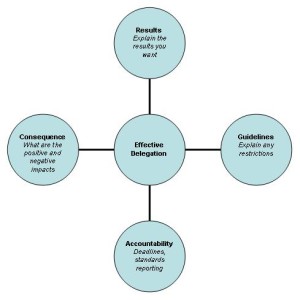Effective Delegation
 Effective delegation is a great way of freeing up your time in routine or non-core tasks to allow you to spend more time on long term problem solving, development and growth activities. It also often brings benefits to the person who is being delegated to – allowing them to take responsibility and perhaps develop new skills/experience.
Effective delegation is a great way of freeing up your time in routine or non-core tasks to allow you to spend more time on long term problem solving, development and growth activities. It also often brings benefits to the person who is being delegated to – allowing them to take responsibility and perhaps develop new skills/experience.
The error that some people make is to adopt a style of delegation that Stephen Covey (in Habit 3 of “The 7 Habits of Highly Effective People) calls ‘gofer’ delegation – go do this, go do that – effectively barking instructions and having someone run round doing small tasks. In reality this gains little time because it encourages reliance on the ‘delegator’ to give the next instruction, increasing interruptions.
The style of the delegating that we need to adopt is ‘stewardship’ where your delegation focuses on the results you want and allows the other person to use their initiative, choose their method and bring their ideas to the task. They take responsibility for the outcome. This is illustrated in the figure above.
- Explain the outcome you want – rather than how you want the person to do it (unless it HAS to be done a certain way). Be specific about exactly what your expectations are. Don’t assume!
- Give guidelines on any restrictions, legalities, compliance, budget, resources to be used, etc.
- Clarity responsibility – as manager you will be ultimately accountable but what are you delegating responsibility for – deadlines, milestones, reporting, quality standards, etc.
- Point out the consequences – what happens if this is done well/what happens if it is not done well/to deadline. Link this with the responsibility and clarify when you want to be notified of any deviation.
For some tasks showing, then allowing the person to trial the activity and demonstrate back before fully going it alone is a good way to avoid risk and develop trust and confidence.
The message is that the hour spent explaining a job thoroughly to someone else and truly delegating ‘stewardship’ can more than gain you back that time to spend on the things that really matter to your purpose and mission – particularly if it is a regular task/activity.
Read more about time prioritization in my article based around Stephen Covey’s Habit 3 – First Things First.